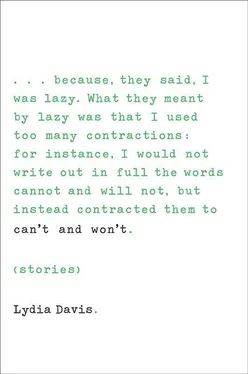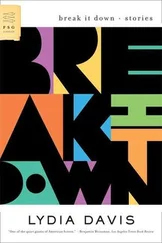Even at first, though, I had not wanted to cut my ties to the college completely. I thought I could give some lectures. I am not afraid of standing up in front of an audience to deliver a lecture that I have written ahead of time. I could do this in exchange for a small fee, I thought. But my plan to give lectures turned out to be impossible. I was told, instead, that I could receive a very small salary if I agreed to teach a special short course each fall, for people from the community. People from the community are usually older, sometimes quite old, and often eccentric. They are also more sympathetic and more respectful of a teacher, so I welcomed this solution.
Then I was no longer afraid of dying. Was this because I had already received some of the money? Was I thinking that if I died now, I would at least not have lost all of it? I had an idea that at first seemed unrelated to my fear of dying: I should prepare for my death now, so that this preparation would be “out of the way” and I could then carry on with my life. If death was the worst thing I had to fear, then I should make my peace with it. But in fact, how could I have thought that this feeling was not related to my earlier fear of dying?
I was also about to begin my letter to the Foundation, I thought. I would tell the Foundation that I was doing everything with more care. You would probably be happy to hear that. And I would tell you that, far from acquiring more things, as I could, now that I had a little more money, I wanted to get rid of all the things I didn’t need, the things that had been stacked on top of bookcases and covered with a thick layer of sticky dust, or pushed inside cupboards, packed in boxes, or crowded into the back of a cabinet in the bathroom, mildewing.
Yet I knew that this might not interest you.
In the letter I was going to write to the Foundation, I was not sure I would tell them about my plans, although maybe I would explain that in my life as it was before, I did not have time for such things as stopping to talk to my neighbors. I was grateful to the Foundation that I could now do these things. I would not tell you that I was not yet working on any serious project, or that I presently spent my days sorting things: medications, lotions, and ointments; magazines and catalogues; socks, pens, and pencils. Maybe I was sorting things because I thought I was going to die. Or maybe I felt that I was not worthy of this award, and that if the Foundation could look in on my life for a few minutes, it would be appalled at the disorder.
I really didn’t think the Foundation had this in mind when they awarded me the grant. I was afraid they would feel they had wasted their money. It would be too late for them to take it back, but they would be disappointed or even angry.
But perhaps my own conscience would sooner or later make me return to the work I should be doing. And perhaps the Foundation was relying on the fact that in the end my conscience would not let me waste my time and therefore their money.
* * *
After I received the first installment of the grant, I was wondering if I could buy something expensive. Then, one day, I nearly bought, by mistake, a sweater that cost $267. I think that is an expensive sweater, though some people would not think so, I know. I had misread the tag and thought it cost $167, which was already expensive enough. I had taken a deep breath and decided to buy it. I did not even try it on — I was afraid I would lose my nerve. When the salesgirl wrote up the slip, I saw the mistake and had to tell her that I would not buy it after all. It was a plain red cardigan. I did not really understand why the material and the one interesting design feature made it so much more expensive than what I was used to paying.
I continued to stand there by the cash register, probably in part so that the salesgirl would think I was not embarrassed at having changed my mind because of the price. I looked down into the glass case of jewelry and admired a necklace that cost $234. It was pretty, but not so pretty that I thought I should spend that amount of money on it. Then I asked the price of a gold bracelet, and she told me that it cost nearly $400. “Gold is expensive, after all,” she said. It was a simple, delicate little bracelet with tiny, thin disks of gold strung on a piece of something I can’t remember now. It was very pretty. But no matter how pretty it was, I would never have spent $400 for it or for any piece of jewelry. In the end, I bought only what I might have bought anyway, a pair of earrings for $36.
I didn’t know if I should ever wear anything expensive. I thought I could, just once, buy one thing as expensive as that bracelet. But should I? I had at one time decided that I would own just a few clothes and that they would be simple but well made. I still had that idea. But if they were well made, did that also mean they were expensive? To dress simply was not necessarily enough if the simple clothes were very expensive. But then, maybe excellent quality would be all right if I bought the clothes secondhand. They would be secondhand, simple, old, a little worn, but of excellent quality. That seemed like a good compromise. But then I worried that if I shopped for them at a secondhand store, I would possibly be taking them away from someone else who really needed them.
* * *
I was going to be busy that spring. The spring had already been planned long before to include a number of rather tiresome short-term jobs that I could not cancel now, such as producing reader’s reports for a publisher, writing short articles, and delivering papers at minor conferences. So my life did not feel any different, and did not seem any more free than it had been, except that from time to time I remembered that I would not be teaching in the fall — as I wrongly believed. The summer would come and I would really be free of every obligation.
But by the time the summer did come, with the prospect of that short course I was now going to have to teach, so many months had passed that I had grown used to feeling two contradictory things: that everything in my life had changed; and that, really, nothing in my life had changed.
* * *
This teaching, here at the college, was not even the first time I had ever taught, as I told you earlier. In other years, some classes went well and some badly. I can remember feeling so faint during the first meeting of one class that I had to put the students to work at an exercise that I contrived on the spot, while I left the room. I went to stand on an outdoor walkway and stared at a grove of eucalyptus trees until I felt better.
Another class, a few years later, at a different college, happened to meet in a room that had once been used as an office by a close friend of mine. In this very same room I had had a series of difficult encounters with her. Maybe that was what made the class particularly hard. During the first meeting, one talented student spoke up rudely when he found out what my requirements were for the course, and he dropped out immediately. I later offended another one because I said something personal which she took the wrong way.
My office hours were scheduled for the hour before the class. None of my students ever came to see me, not once, and so I always sat in my cubicle alone. It was an evening class, and the building was almost empty at that hour, but next door to me was another cubicle occupied by a more popular and successful teacher. I would sit alone in the nearly empty building and listen to everything he said to the steady stream of his own students.
I tell myself: There are just four of these hours each week. The four hours come one at a time, two on Tuesday and then two more on Thursday — just four small hours out of the whole week. But each casts a very long, very dark shadow on the day before, even on the two days before, and that shadow is especially dark the morning of each day of classes, and then darkest of all during those terrible ten or twenty minutes before the class, which include the last, almost unbearable minute of walking out the door of my office.
Читать дальше












